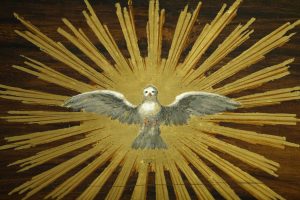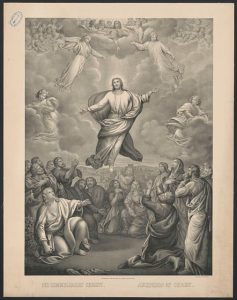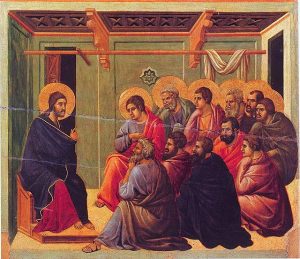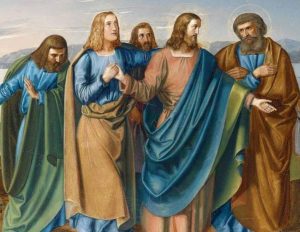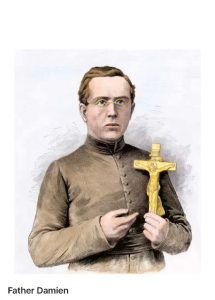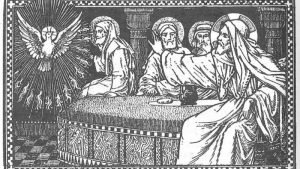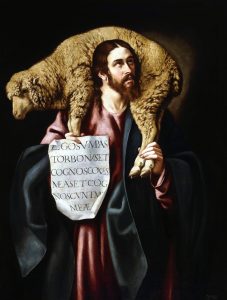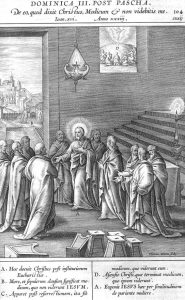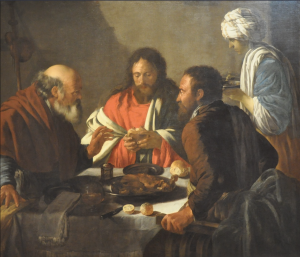Today is the 5th Sunday of Easter. It is nice to return from my pilgrimage which was very spiritually uplifting. I have a new perspective of the gospel events and how Jesus, together with His chosen Apostles, were able to fulfill their mission to spread God’s love. Their own commitment, words and witnessing continue to lead people to God.
The first reading from the Acts of the Apostles raised concern about the widows being neglected. The twelve apostles called upon the community of disciples to choose from amongst themselves seven men filled with Spirit and Wisdom to help with the concern regarding the widows, thereby leaving the apostles able to continue preaching and praying. They knew that they could not manage to do everything, because “the number of disciples in Jerusalem increased greatly and even a large group of priests were becoming obedient to the faith.” They were not only keeping the faith, but their work concerning the widows, the poor and the deprived or under privileged people resulted in their growing as a community due to their commitment to help and care for the needy.
The second reading from the first letter of St. Peter 2:4-9, invites us again to build the foundation of our faith on the very cornerstone of who is Jesus. We need to be aware that the solid rock is Jesus who will last forever and who calls us out of darkness into His wonderful light. Our spirituality is solely based on the importance of acknowledging the true cornerstone, Jesus Christ. who always leads us away from all troubles.
The gospel from St. John consoles me that even if we have a troubled heart, we are always reminded “to have faith in God and also have faith in Him.” A few days ago, when I was in Jerusalem, I was able to visit Jesus’ sepulcher, the empty tomb. Thousands of people were lining up to see what is inside the tomb and what it looks like inside that small opening. We stayed there waiting patiently for over two and an half hours for our turn to enter. I said to my companions, “Why do we spend almost half a day waiting to enter this empty tomb when we all know that Jesus has risen? The empty tomb will be empty forever, and we know that; however, our hearts will not remain empty because they have been filled with much “Faith” in the resurrection.”
In today’s gospel, Jesus again offers substantial promises to His disciples:
First, Jesus promises to prepare a place for us. It is not only provisions for everyone, but in His Father’s house there are many dwelling places that have been prepared for those who followed Him to God’s house.
Second, the fact that it was Jesus saying it, Thomas again asked Jesus, how we would follow Him since we don’t know the way. Jesus responded, “I am the Way, the Truth, and the Life. No one comes to the Father except through Me.” Jesus is leading us to know the way to eternal life. We would never be wrong to know the Truth and to have Life for eternity.
Third, Thomas was not the only one asking Jesus, but Philip was much worse. He asked, “Master, show us the Father, and that will be enough for us.” Jesus responded, “I say to you, whoever believes in me will do the works that I do, and will do greater ones than these, because I am going to the Father.” These words of Jesus clearly point out that He is personally with the apostles, and they see that with their own eyes. The problem with Philip, like some of us, we try to see differently the Son of God, Jesus, and the Father. The existence of the Father who is the “Presence” and the Son who is the “Word” is intimately one according to 1 John 5:6-7. “For there are three that bear record in heaven, the Father, the Word, and the Holy Ghost: and these three are one.” Jesus and the Father are One.
We, like the apostles, have to believe, and if we believe, we have to believe and live-out that faith every day of our lives. Of course, it is not easy, however, we rely on the Lord’s guidance and His promises.
St. Augustine reminds us that we must always be an “Easter people”. I know that our desire is to be a People of God and community of faith with our song, “Alleluia.” In each of our human encounters, we are dealing with so many unexplained occurrences in life that make us confused and anxious whether we are indeed Easter people. There is so much violence, war and poverty that obscure the reality of God, yet all these human problems cannot match what has been promised to us, that is the hope of the resurrection. I believe that it is part of the “Paschal Mystery,” which speaks of the reality of Jesus’ passion, death, and resurrection. This is an easy answer to the world’s problem because our life here on earth is not the finality of itself.
God’s way and truth tells us that He defies everything by proving to us that He resurrects and comes to life again, and death has no power over Him anymore. He is alive, an invitation for all of us to enter into His saving love for all eternity.
God bless you.
Fr. Arlon, osa
————————————
El Dictado del Corazón
Quinto Domingo de Pascua, Año A
- Hechos 6:1-7
- Salmos 33:1-2, 4-5, 18-19
- 1 Pedro 2:4-9
- Juan 14:1-12
Hoy es el Quinto Domingo de Pascua. Es agradable estar de regreso, después de la peregrinación, que fue edificante espiritualmente. Tengo una nueva perspectiva de los eventos del evangelio y cómo Jesús, junto con sus Apóstoles escogidos, pudieron cumplir su misión de difundir el amor de Dios. Su compromiso, palabras y testimonio continúan guiando a las personas a Dios.
La primera lectura de los Hechos de los Apóstoles suscitó la preocupación de que las viudas no fueran desatendidas. Las doce personas designadas llenas de Espíritu y Sabiduría para ayudar a continuar su ministerio de manera eficiente mientras que los 12 discípulos pudieron concentrarse en predicar y orar. Sabían que no podrían lograrlo todo, porque “el número de discípulos en Jerusalén aumentaba mucho y hasta un gran grupo de sacerdotes se hacían obedientes a la fe”. No sólo el mantenimiento de la fe, sino su trabajo en favor de las viudas, los pobres y las personas necesitadas o desfavorecidas redunda en su crecimiento como comunidad debido a su compromiso de ayudar y cuidar a los necesitados.
La segunda lectura de la primera carta de San Pedro 2:4-9 nos invita nuevamente a construir el fundamento de nuestra fe sobre la piedra angular misma que es Jesús. Necesitamos ser conscientes de que la roca sólida es Jesús, quien durará para siempre y nos llama de las tinieblas a su luz maravillosa. Nuestra espiritualidad se basa únicamente en la importancia de reconocer la verdadera piedra angular, Jesucristo, quien siempre nos aleja de todos los problemas.
El evangelio de San Juan me consuela que incluso si tenemos corazones atribulados, siempre se nos recuerda “tener fe en Dios y también tener fe en Él”. Hace unos días, cuando estuve en Jerusalén, pude visitar el sepulcro de Jesús, la tumba vacía. Miles de personas hacían fila para ver cómo es la tumba, cómo se ve dentro de esa pequeña abertura. Allí estuvimos esperando pacientemente nuestro turno para entrar durante más de dos horas y media. Les dije a mis compañeros: “¿Por qué tardamos casi medio día en entrar en esta tumba vacía cuando todos sabemos que Jesús ha resucitado? La tumba vacía siempre estará vacía para siempre, sabemos que, sin embargo, nuestro corazón no permanecerá vacío porque ha sido lleno de mucha “Fe” en la resurrección”.
En el evangelio de hoy, Jesús nuevamente ofrece promesas sustanciales a sus discípulos:
Primero, Jesús nos promete preparar un lugar para nosotros. No son solo provisiones para todos, sino que en la casa de Su Padre, muchas moradas han sido preparadas para aquellos que lo siguieron a la casa de Dios.
En segundo lugar, el hecho de que fuera Jesús quien lo decía, Tomás le preguntó de nuevo a Jesús cómo lo seguiríamos si no conocemos el camino. Jesús respondió: “Yo soy el Camino, la Verdad y la Vida. Nadie viene al Padre sino por Mí”. Jesús nos está guiando a conocer el camino a la vida eterna. Nunca nos equivocaríamos al conocer la Verdad y tener una Vida de eternidad.
Tercero, Tomás no solo le estaba preguntando a Jesús, sino que Felipe fue mucho peor, le pidió: “Maestro, muéstranos al Padre, y eso nos bastará”. Jesús respondió: “Os digo que el que cree en mí, hará las obras que yo hago, y las hará mayores que estas, porque yo voy al Padre”. Estas palabras de Jesús señalan que Él está personalmente con los apóstoles. , y ellos los ven con sus propios ojos. El problema con Felipe, como algunos de nosotros, tratamos de ver de otra manera al Hijo de Dios, Jesús, y al Padre. La existencia del Padre que es la “Presencia” y el Hijo. quien es el “Verbo” es íntimamente uno según 1 Juan 5:6-7 Jesús y el Padre son Uno.
Nosotros, como los apóstoles, tenemos que creer, y si creemos, tenemos que creer y vivir esa fe todos los días de nuestra vida. Por supuesto, no es fácil, sin embargo, confiamos en la guía del Señor y en Sus promesas.
San Agustín nos recuerda que debemos ser siempre un “pueblo de Pascua”. Sé que nuestro deseo de ser un Pueblo de Dios y una comunidad de fe con nuestro canto, “Aleluya”. En cada uno de nuestros encuentros humanos, estamos lidiando con tantos sucesos inexplicables en la vida que nos confunden y nos ponen ansiosos acerca de si realmente somos personas de Pascua. Hay tanta violencia, guerra y pobreza que oscurecen la realidad de Dios, pero todo estos problemas humanos no pueden corresponder a lo que se nos ha prometido, que es la esperanza de la resurrección, creo que es parte del “Misterio Pascual”, que habla de la realidad de la pasión, muerte y resurrección de Jesús. una respuesta fácil al problema del mundo porque nuestra vida aquí en la tierra no es la finalidad en sí misma. El camino y la verdad de Dios nos dicen que Él desafía todo al probarnos que Él resucita y vuelve a la vida y que la muerte ya no tiene poder sobre Él. . Él está vivo, una invitación para que todos nosotros entremos en Su amor salvador por toda la eternidad.
Dios los bendiga.
Padre Arlón, osa

